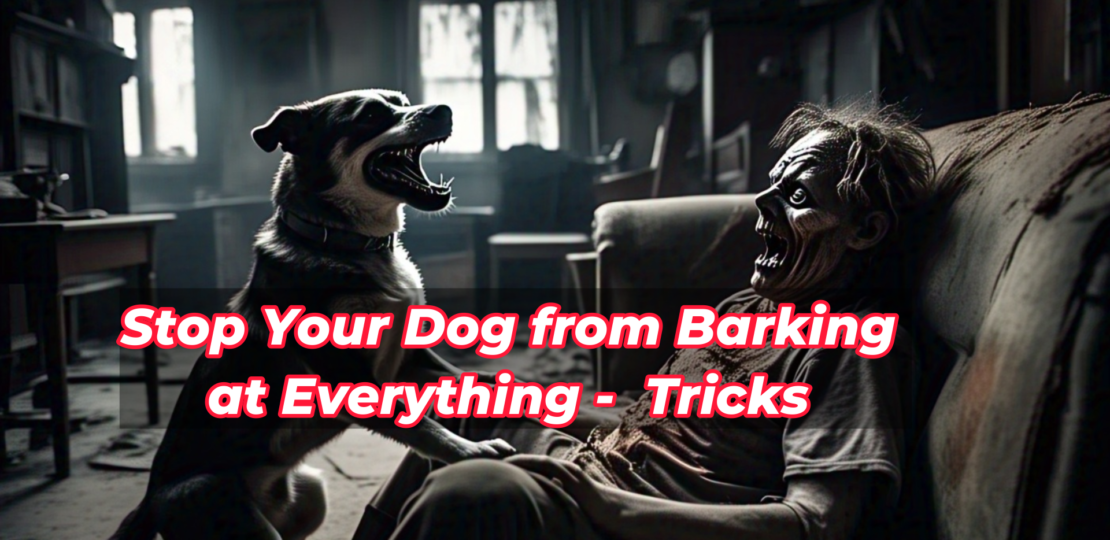How to Stop Your Dog from Barking at Everything – Amazing Tricks!
May 8, 2025 | by PetLover

Does your dog sound like a furry alarm system, barking at the mailman, squirrels, shadows, and even its own reflection? Excessive barking can be frustrating—for you, your neighbors, and even your pup. But before you consider a “bark collar,” know this: most barking issues can be fixed with the right training and understanding of why your dog is vocalizing in the first place.
In this guide, we’ll break down the root causes of barking, how to address them effectively, and quick fixes to reduce noise fast—without yelling or punishment. Whether your dog barks out of boredom, fear, or excitement, we’ve got proven solutions to bring peace back to your home.
Why Do Dogs Bark Excessively? (The Root Causes)
Before you can stop the barking, you need to understand why your dog is doing it. Barking is natural—it’s how dogs communicate—but excessive noise usually stems from one of these common triggers:
1. Alert/Protective Barking
- “Someone’s here!” – Dogs bark to warn you of “intruders” (mail carriers, delivery people, or even a leaf blowing by).
- Solution: Teach a “quiet” command (more on this later) and limit access to windows/doors if your dog is overly territorial.
2. Boredom or Loneliness
- “I’m stuck here with nothing to do!” – Dogs left alone for long periods may bark out of frustration or separation anxiety.
- Solution: Increase mental stimulation (puzzle toys, chew treats) and ensure your dog gets enough exercise.
3. Fear or Anxiety
- “That loud noise is scary!” – Thunder, fireworks, or unfamiliar people can trigger fearful barking.
- Solution: Desensitize your dog to triggers with positive reinforcement (e.g., treats when they stay calm).
4. Attention-Seeking Barking
- “Hey, look at me!” – Some dogs learn that barking gets them food, playtime, or cuddles.
- Solution: Ignore demand barking and reward quiet behavior instead.
5. Excitement or Playfulness
- “I’m so happy I can’t contain myself!” – Overstimulated dogs bark during play or when greeting people.
- Solution: Train an alternative behavior, like “sit for pets” instead of jumping and barking.
How to Stop Barking Fast (Quick Fixes)
If you need immediate relief from constant barking, try these fast-acting strategies:
1. Remove the Trigger (If Possible)
- Close curtains to block outside movement.
- Use a white noise machine to mask scary sounds (thunder, construction).
- Move your dog to a quieter room if they’re overstimulated.
2. The “Quiet” Command – Train in 5 Minutes
- Let your dog bark 2-3 times, then say “quiet” in a calm, firm voice.
- Hold a treat near their nose—the sniffing will interrupt barking.
- The second they pause, say “yes!” and reward.
- Repeat daily until they associate “quiet” with stopping barking.
3. Distract with a High-Value Toy or Treat
- Toss a Kong stuffed with peanut butter or a squeaky toy to redirect their focus.
4. Exercise Before Alone Time
- A 20-minute walk or play session can tire your dog out, reducing boredom barking.
Long-Term Solutions for a Quieter Dog
For lasting results, combine quick fixes with these training and lifestyle changes:
1. Desensitization Training (For Reactive Dogs)
- If your dog barks at dogs, people, or cars:
- Start at a distance where your dog notices the trigger but doesn’t bark.
- Reward calm behavior with treats.
- Gradually decrease the distance over weeks.
2. Teach the “Speak and Quiet” Combo
- Train your dog to bark on command (say “speak,” wait for a bark, then reward).
- Once they master “speak,” introduce “quiet”—reward only when they stop barking.
3. Provide Mental Stimulation
- Boredom = Barking. Try:
- Puzzle toys (like the Outward Hound Nina Ottosson series).
- Frozen lick mats with yogurt or pumpkin.
- Daily training sessions (even 10 minutes helps).
4. Manage Separation Anxiety
- If your dog barks when left alone:
- Practice short departures (1–5 minutes) and reward calm behavior.
- Leave background noise (TV or calming music).
- Consider adaptil diffusers (pheromone calming aids).
What NOT to Do When Your Dog Barks
Avoid these common mistakes that can make barking worse:
❌ Yelling “No!” – Your dog thinks you’re joining in the noise.
❌ Punishing After the Fact – Dogs don’t connect punishment to past barking.
❌ Using Shock or Citronella Collars – These can increase anxiety and aggression.
When to Seek Professional Help
If your dog’s barking is destructive, obsessive, or paired with aggression, consult a:
- Certified dog trainer (look for CPDT-KA credentials).
- Veterinarian (to rule out pain or cognitive decline in older dogs).
Final Thoughts: Patience & Consistency Win!
Stopping excessive barking isn’t about silencing your dog forever—it’s about teaching them when barking is appropriate and providing better ways to communicate. With the right training, mental stimulation, and consistency, you’ll see major improvements in just a few weeks.
Try one tip today, and soon, you’ll have a quieter, happier pup—and calmer neighbors!
🐾 Got a specific barking challenge? Ask in the comments below! 🐾
RELATED POSTS
View all



